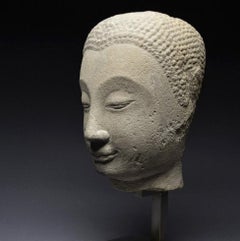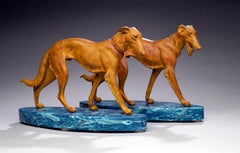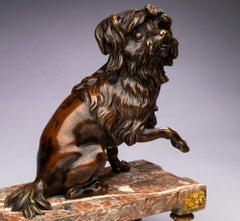Want more images or videos?
Request additional images or videos from the seller
1 of 6
UnknownIndian Pink Sandstone Figure of a Deity, Central India, 11th/12th centuryCirca 11th/12th century
Circa 11th/12th century
Price:$25,000
$48,750List Price
About the Item
- Creation Year:Circa 11th/12th century
- Dimensions:Height: 22 in (55.88 cm)Width: 10.5 in (26.67 cm)Depth: 6 in (15.24 cm)
- Medium:
- Period:
- Condition:Though this piece clearly suffered damage from ancient marauders, the piece is very fine and presents wonderfully. The swollen belly exudes prana, or the breath of life.
- Gallery Location:SANTA FE, NM
- Reference Number:1stDibs: LU140826798702
About the Seller
5.0
Gold Seller
Premium sellers maintaining a 4.3+ rating and 24-hour response times
Established in 1995
1stDibs seller since 2020
121 sales on 1stDibs
Typical response time: 2 hours
Authenticity Guarantee
In the unlikely event there’s an issue with an item’s authenticity, contact us within 1 year for a full refund. DetailsMoney-Back Guarantee
If your item is not as described, is damaged in transit, or does not arrive, contact us within 7 days for a full refund. Details24-Hour Cancellation
You have a 24-hour grace period in which to reconsider your purchase, with no questions asked.Vetted Professional Sellers
Our world-class sellers must adhere to strict standards for service and quality, maintaining the integrity of our listings.Price-Match Guarantee
If you find that a seller listed the same item for a lower price elsewhere, we’ll match it.Trusted Global Delivery
Our best-in-class carrier network provides specialized shipping options worldwide, including custom delivery.You May Also Like
Standing Engel
Located in Wien, Wien
Standing angel with banner
Flemish
Around 1450/60
Sandstone
60 x 21 x 15 cm
This museum figurine shows a standing angel with a banner in his right hand and a small box in his left. The youthful, ageless figure wears a coat held together with a triangular, floral brooch in front of the chest over a long robe. The angel’s gaze is directed forward, his head tilted slightly to the left. The elongated face is sculpted: the large almond-shaped eyes with accentuated upper and lower eyelids are alertly open and sharp eyebrows lead directly into the root of the nose. The straight nose above the pronounced mouth completes the idealized oval face of the angel and his calm, internalized facial expression. What is particularly remarkable, however, is the magnificent curls, which are only partially tamed by a simple headband. As if puffed up by the wind, the hair, which is sometimes streaked in parallel, sometimes wildly twisted and richly curled, stands out dynamically from the ears. The tilted head with these sideways protruding waves of hair thus conveys an immediate impression of movement. The physicality of the sculpture is expressed particularly through this organic, lifelike movement of the loosened hair.
The lively overall impression of the figure is further enhanced by the multiple rolled banners that the angel presents to the viewer. The outstretched palm of the right hand appears both intimate and confidential as well as mystically revealing. This banderole winds in gentle curves in front of the figure’s body, throws a fold over the second attribute in the angel’s left hand and falls downwards in a loose manner. The volute-shaped rolled up end of the banner clearly shows the fine texture of the banner and at the same time draws the viewer’s attention to the small cube-shaped box that the angel is holding in its slender, long-limbed fingers. The cube is decorated with a Gothic quatrefoil motif, which is often seen in the architectural tracery of windows, but was also often used to decorate caskets and other small treasures. The sweeping gestures in the presentation of the attributes suggest three-dimensionality, in contrast to the tubular folds at the base of the neck and the intricate draperies in flat and multiple overlapping garment sections. The soft curves of the folds give the impression that the clothing is made of a heavy fabric that falls diagonally down the front and is laid in several bowl folds under the right hand.
Overall, the sculptural work testifies to the highest artistic skill, which emphasizes the virtuosity of sculpture in its precious and representative overall impression. The memorable characteristics recognizable here can be seen in comparable pictorial works from Utrecht around the middle of the 15th century, when sculptural art – especially stone sculpture – was characterized by a remarkably high quality. Particularly noteworthy is the accentuated Utrecht head type with an elongated oval face, almond-shaped eyes with heavy lids and dense, vividly protruding tufts of hair framing the head. For example, the figure is comparable to a capital of an angel on the east side of the rood screen of the Joriskerk in Amersfoort (province of Utrecht) from the second quarter of the 15th century. Not only the physiognomy and hair, which in the comparative example stand somewhat more horizontally to one side, but also the garment puff above the girdle are similar. Even more related motifs, such as the cleverly placed bowl folds, can be found on the limestone figure...
Category
15th Century and Earlier Figurative Sculptures
Materials
Sandstone
Large romanesque sculpture depicting Saint Lucy. Northern Spain.
Located in PARIS, FR
Large romanesque statue of Saint Lucy of Syracuse is dated from the 12th century. The saint is represented veiled and diademed, she wears a long dress, with an important tie. Stone s...
Category
15th Century and Earlier Medieval Figurative Sculptures
Materials
Sandstone
$18,050
Free Shipping
H 19.69 in W 6.3 in D 6.7 in
Cutouts, 41" high bronze and stone bench
By Jane DeDecker
Located in Loveland, CO
"Cutouts" by Jane DeDecker
Figurative Bronze, 41x40x20" Sandstone bench is included.
A girl sits quietly unfolding her paper cutouts. Great piece for a...
Category
2010s Impressionist Figurative Sculptures
Materials
Sandstone, Bronze
Standing Together, 42" high bronze
By Jane DeDecker
Located in Loveland, CO
Standing Together by Jane DeDecker
Figurative Bronze. 42x24x24"
Sandstone base is included.
Two Girls stand back to back holding hands Sisters, or Best Friends. A union for life.
A...
Category
2010s Impressionist Figurative Sculptures
Materials
Sandstone, Bronze
Check it Out, 48" high Bronze
By Jane DeDecker
Located in Loveland, CO
Check It Out by Jane DeDecker
48x22x15" ed/31 Figurative Bronze with Sandstone base
A child steadies a stack of books on their head,
ABOUT THE ARTIST: 'Part of Jane's artistic geniu...
Category
2010s Impressionist Figurative Sculptures
Materials
Sandstone, Bronze
Love and Forgiveness
By Denny Haskew
Located in Loveland, CO
"Love and Forgiveness" by Denny Haskew
Figurative Bronze on Sandstone Round Base, Christ Resurrection, Cross
14h 10w 10d
"In choosing a title fo...
Category
Early 2000s Contemporary Figurative Sculptures
Materials
Sandstone, Bronze
At Eagle's Glance study
By Denny Haskew
Located in Loveland, CO
"At Eagle's Glance" by Denny Haskew
Figurative Native American subject matter.
15x11x17" ed/30, bronze with sandstone base, signed and numbered 4.
Depicts two men performing a cerem...
Category
Early 2000s Contemporary Figurative Sculptures
Materials
Sandstone, Bronze
Listening for Spirit
By Denny Haskew
Located in Loveland, CO
Listening for Spirit by Denny Haskew
Female nude
Bronze (silver nitrate patina) on sandstone 8x6x10" ed/30 (height is variable based on stone)
si...
Category
Early 2000s Contemporary Figurative Sculptures
Materials
Sandstone, Bronze
Committed
By Denny Haskew
Located in Loveland, CO
Committed by Denny Haskew
Figurative Bronze on Sandstone Base Limited Edition of 35
20h 8.5w 7d inches #15 pictured
"I give to you all that I am.
My faith in Spirit is unchanging.
E...
Category
Early 2000s Contemporary Figurative Sculptures
Materials
Sandstone, Bronze
Our Love
By Denny Haskew
Located in Loveland, CO
"Our Love" by Denny Haskew
Figurative Female Nude
23x10x10" Bronze with Gold Leaf, Limited Edition of 21 (#2 available)
Sandstone base included
"Love isn't something you find. Love...
Category
2010s Contemporary Figurative Sculptures
Materials
Sandstone, Bronze, Gold Leaf
More From This Seller
View AllLarge 17th century, Sandstone Buddha Head from Thailand, Ayutthaya Kingdom
Located in SANTA FE, NM
Large Sandstone Head of Shakyamuni Buddha
Thailand (formerly Siam), Ayutthaya Kingdom
17th century
16 1/2 inches on stand, 11 1/3 without
Private collection, France.
The face is ...
Category
17th Century Other Art Style Figurative Sculptures
Materials
Sandstone
Antique Pair of Russian Wolf Hound/Borzoi Dog Portrait Sculptures circa 1930's
Located in SANTA FE, NM
Antique Pair of Russian Wolfhounds/Borzois Dog Portrait Sculptures
by Scalini (aka Scali; Italian, 20th century)
circa 1930's
Patinated spelter
9 x 14 inches (on bases)
Though rath...
Category
1920s Art Deco Figurative Sculptures
Materials
Cast Stone, Bronze
$2,310 Sale Price
40% Off
Antique 19th century Bronze Dog Portrait of a Löwchen on a Marble Base
Located in SANTA FE, NM
Antique Bronze Dog Portrait of a Löwchen on a Marble Base
French 19th century
1/2 x 8 x 5 1/2 inches
The chiseled bronze has a nuanced, rich brown patina depicting a Löwchen in the round, seated on a quadrangular marble base decorated with very fine gilt bronze flowers and fluted feet. Napoleon III, Louis XVI style. Based on a model by Jacques Caffieri for the Prince de Condé in 1773.
(More images to be added.)F
Executed during the nineteenth century, this figure is fully in line with the eclectic taste of the reign of Napoleon III. Indeed, the Empress Eugenie brought the Louis XVI style up to date in her castle of Compiègne. Jacques Caffieri is one of the most famous bronze smiths of the eighteenth century. In 1715 he was admitted as a master caster and chiseler, and worked almost exclusively for the crown castles...
Category
19th Century Rococo Figurative Sculptures
Materials
Marble, Bronze
Pair of Italian "Alabaster Stone Lions" after Antonio Canova; Mid 19th Century
Located in SANTA FE, NM
"Pair Recumbent Stone Lions"
after Antonio Canova (1757-1822)
Italian (possibly Florence)
Mid 19th Century
Alabaster, marble
6 x 9 x 4 inches
This is an exquisite pair of Italian alabaster lions on marble bases based on the monumental lions carved by Antonio Canova (1757-1822), the greatest Italian neoclassical sculptor. Canova sculpted the marble lions for the monumental tomb of Pope Clement XIII in St. Peter’s, Rome in 1792
Canova Lions refers to the pair of copies of lion sculptures by Antonio Canova. When Canova created the sculptures in 1792, he installed them on the tomb of Pope Clement XIII. The marble sculptures are some of the most prominent features in St. Peter's Basilica in Rome. Given the intricacies of creating the original Canova lions, some artists created molds and replicated them. A good example is the pair of lion sculptures...
Category
1850s Italian School Figurative Sculptures
Materials
Marble, Alabaster
Rare, Antique, Life-Size Dog Bronze of a Chihuahua "Lydie" Charles Valton. 1890s
By Charles Valton
Located in SANTA FE, NM
Antique Bronze Dog Sculpture
Chihuahua "La Petite Belle Lydie"
Charles Valton (French, 1851-1918)
Circa 15 1/2 x 10 1/4 x 7
Lydie is a Chihuahua making her a very rare image from ...
Category
Late 19th Century Realist Figurative Sculptures
Materials
Bronze
Antique Bronze Dog Portrait of a Cavalier King Charles "Thigley" circa 1905
Located in SANTA FE, NM
Antique Bronze Dog Portrait of a Cavalier King Charles
"Thigley"
French School (possibly Franck Burty Haviland)
Lost wax bronze casting
Circa 1910
5 7/8 x 9 x 3 1/4
A sophisticated bronze casting of a Cavalier King Charles spaniel made in lost wax casting (cire perdue) from the beginning of the 20th century by Valsuani Foundry. This an unusual bronze approached in its aesthetic that’s reminiscent of the work of great animal sculptors of the second half of the 19th century except in this presentation which is more avant-garde for the time with a much looser, more impressionistic execution. The patina is a superb bronze color, brown and slightly greenish, going in places towards a more antique green.
The attitude of the dog is extremely well and sensitively rendered with the placement of material unlike the renderings of a bronze by Barye...
Category
Early 1900s French School Figurative Sculptures
Materials
Bronze
$5,040 Sale Price
32% Off
Recently Viewed
View AllMore Ways To Browse
Sculpture India Sandstone
Antique Solar System
Hindu Gods
Indian Sandstone
12th Century Sculpture
Indian Torso
Indian Pink Sandstone
Vintage Hockey Skates
Vintage Pony Express
Vintage Soccer Posters
Vintage Western Movie Posters
Volkswagen Poster
Warren W Sheppard
Wild Boar Painting
William Adolphus Knell
William Chadwick
William Muller
Writers Block



